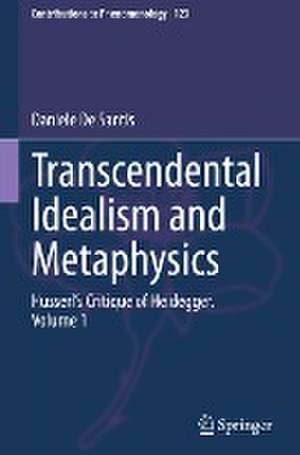Transcendental Idealism and Metaphysics: Husserl's Critique of Heidegger. Volume 1: Contributions to Phenomenology, cartea 123
Autor Daniele De Santisen Limba Engleză Hardback – 20 oct 2023
| Toate formatele și edițiile | Preț | Express |
|---|---|---|
| Hardback (2) | 702.05 lei 6-8 săpt. | |
| Springer Nature Switzerland – 20 oct 2023 | 702.05 lei 6-8 săpt. | |
| Springer Nature Switzerland – 20 oct 2023 | 732.84 lei 6-8 săpt. |
Din seria Contributions to Phenomenology
- 20%
 Preț: 630.93 lei
Preț: 630.93 lei - 20%
 Preț: 693.50 lei
Preț: 693.50 lei - 8%
 Preț: 509.67 lei
Preț: 509.67 lei - 18%
 Preț: 984.42 lei
Preț: 984.42 lei - 18%
 Preț: 1230.03 lei
Preț: 1230.03 lei - 15%
 Preț: 645.79 lei
Preț: 645.79 lei - 15%
 Preț: 657.39 lei
Preț: 657.39 lei - 18%
 Preț: 728.28 lei
Preț: 728.28 lei - 15%
 Preț: 635.96 lei
Preț: 635.96 lei - 15%
 Preț: 578.87 lei
Preț: 578.87 lei - 15%
 Preț: 638.43 lei
Preț: 638.43 lei - 15%
 Preț: 691.59 lei
Preț: 691.59 lei - 20%
 Preț: 505.33 lei
Preț: 505.33 lei - 15%
 Preț: 645.28 lei
Preț: 645.28 lei - 15%
 Preț: 637.28 lei
Preț: 637.28 lei - 18%
 Preț: 951.91 lei
Preț: 951.91 lei - 15%
 Preț: 634.00 lei
Preț: 634.00 lei - 15%
 Preț: 646.75 lei
Preț: 646.75 lei - 18%
 Preț: 727.97 lei
Preț: 727.97 lei - 15%
 Preț: 693.71 lei
Preț: 693.71 lei - 18%
 Preț: 729.06 lei
Preț: 729.06 lei - 15%
 Preț: 692.56 lei
Preț: 692.56 lei - 18%
 Preț: 778.94 lei
Preț: 778.94 lei - 18%
 Preț: 780.68 lei
Preț: 780.68 lei - 15%
 Preț: 646.62 lei
Preț: 646.62 lei - 18%
 Preț: 1231.47 lei
Preț: 1231.47 lei - 18%
 Preț: 730.35 lei
Preț: 730.35 lei - 18%
 Preț: 784.61 lei
Preț: 784.61 lei -
 Preț: 432.71 lei
Preț: 432.71 lei
Preț: 732.84 lei
Preț vechi: 893.71 lei
-18% Nou
Puncte Express: 1099
Preț estimativ în valută:
140.24€ • 152.29$ • 117.81£
140.24€ • 152.29$ • 117.81£
Carte tipărită la comandă
Livrare economică 22 aprilie-06 mai
Preluare comenzi: 021 569.72.76
Specificații
ISBN-13: 9783031395857
ISBN-10: 3031395859
Pagini: 268
Ilustrații: XXVII, 268 p. 9 illus.
Dimensiuni: 155 x 235 mm
Greutate: 0.59 kg
Ediția:1st ed. 2023
Editura: Springer Nature Switzerland
Colecția Springer
Seria Contributions to Phenomenology
Locul publicării:Cham, Switzerland
ISBN-10: 3031395859
Pagini: 268
Ilustrații: XXVII, 268 p. 9 illus.
Dimensiuni: 155 x 235 mm
Greutate: 0.59 kg
Ediția:1st ed. 2023
Editura: Springer Nature Switzerland
Colecția Springer
Seria Contributions to Phenomenology
Locul publicării:Cham, Switzerland
Cuprins
Introduction (Introducing the Idea of Hegemony to Phenomenology).- PART I. The Transcendental Subject or, of First Philosophy.- Chapter 1: Confusion and Obscurity of the Subjects.- Chapter 2: Concreteness of the Subject: Dasein.- Chapter 3: Concreteness of the Subject: The Monad.- Chapter 4: Exemplary Entities: Formal Indication and Eidetic Variation.- Chapter 5: The Nomos of the Transcendental, CODA—Remarks on the Person in CM V.- Chapter 6: Primum Concretum and Transcendental Idealism.- Appendix: Of a Hegemonic Discourse about the History of Early Phenomenology: Outline of a Paradigm Revision.- Conclusion.
Notă biografică
Daniele De Santis (1983) is Assistant Professor in the Department of Philosophy and Religious Studies (ÚFAR) of Charles University, Prague. He works mainly on the history of early phenomenology (Husserl, Stein, Hering, Heidegger, Beck) and the history of philosophy (Plato, history of Platonism, Kant, Lotze). He is the editor in-chief of The New Yearbook for Phenomenology and Phenomenological Philosophy (Routledge); he has recently published the monograph Husserl and the A Priori. Phenomenology and Rationality (Springer 2022); and the collective volumes: The Routledge Handbook of Phenomenology and Phenomenological Philosophy (Routledge 2021) and Wilfrid Sellars and Phenomenology: Encounters, Intersections, Oppositions (Ohio University Press 2022).
Textul de pe ultima copertă
The book offers a systematic reconstruction of the disagreement between Husserl and Heidegger from the former's perspective, but without falling into any form of Husserlian apologetics. The main thesis is that Husserl's critique of Heidegger's existential analytics as a form of philosophical anthropology entails a deeper fundamental thesis, namely that Heidegger confuses the object of first philosophy (the transcendental determination of the subject) with metaphysics (in the Husserlian sense of the expression). Addressing the Husserl-Heidegger confrontation, this text provides the first systematic reconstruction of Husserl's conception of the system of philosophy from the perspective of his later works, with a special focus on the Cartesian Meditations. At stake in Husserl's critique of Heidegger's philosophy in Being and Time is the refusal to transcendentalize the irrational aspects and nature of our human existence. This first volume addresses Husserl's doctrine of transcendental idealism with the aim of elucidating the distinction between first philosophy, second philosophies and what Husserl calls last philosophy. This volume appeals to students and researchers.
Caracteristici
Covers Husserl’s system of philosophy as a whole Provides a systematic interpretation of Husserl’s critique of Heidegger Tackles Husserl’s transcendental idealism alongside his critique of Heidegger
